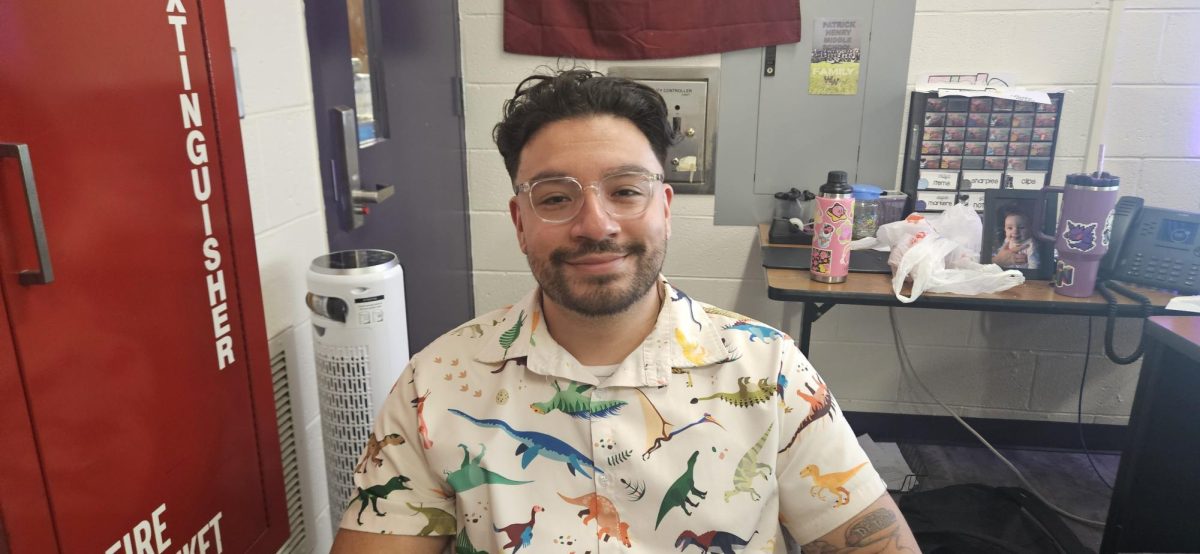There are many curiosities associated with the decline of student academic achievement. The rapid evolution of technology and people is known best by our government and history teacher at WHS, Mr. Johnson-LeMieux. His experiences as a history enthusiast and a teacher can shed light on the drastic differences between classrooms today versus classrooms ten years ago when it comes to classroom management and the effects of technology.
How has the change in technology affected students over the past 10 years?
“Technology isn’t just something students do for fun, obviously, it has also changed the way that we do things in class too. We have one-to-one Chromebooks, so everybody has a piece of technology on them at all times. It’s really just a matter of how people use them and for some students, it’s a great tool. For example, a student who doesn’t have English as their first language, they can look things up on Google and it helps them to learn better in a way that if they didn’t have the computer they wouldn’t be able to do that. On the other hand, it’s the internet, so everybody has everything available to them and even though we have filters, students know ways to get around them. It’s a great source of learning, a great tool if you have it, but it’s also a great source of distraction.”
What are your thoughts on the increasing technology use in schools?
“I actually have a master’s degree in technology and teaching, so that’s kind of what I went to school to learn about. One of the things I learned as I went through it was that technology is great and it can be a great tool, but if students don’t have basic skills then it’s not going to make a difference. I think reading skills are not as strong as they used to be but I don’t want to blame technology completely for that, it’s cultural too, but students certainly have lots of other things they can do besides reading. In my classroom at least, I’ve spent a lot more time trying to get students away from technology. Every single assignment that I do, I provide an online version but also a paper version so that if students are distracted by technology they will be able to focus on their work.”
Do you think technology should be taken from elementary and middle school students so they can focus on reading better?
“Again I think it’s not necessarily a universal thing, I think it depends on the kid. I certainly don’t think elementary and middle school students should have access to cell phones in class. They have proven that technology, video games, social media, and cell phones are all just as addictive for some people as drugs can be. I think getting kids hooked on that early can be more dangerous. It’s fine for adults but I do think we need to limit kids’ access to all of the internet until maybe high school. In the classroom, in terms of learning, I think it’s an advantage for some students to have it that need it. Some people think that technology will fix everything and I don’t believe that. I think that students should have time away from technology, in school, where they’re just focused on the text.”
What do you think the outcome would be if phones were banned in schools before they could even become a distraction?
“I would support that myself. We’re just so used to instant communication that we forget that it was only like 10 years ago that parents could get ahold of kids whenever they wanted. They just called the office and the office sent them a message. I mean it’s not that hard to do but I do think that parents are very very attached to their children, not all of them, but some of them. If they don’t get feedback instantly they start to panic and have anxiety. Half the time I have to talk to kids about being on their cellphones in class and they say “Oh I’m talking to my mom” and it’s like “Tell your mom to stop it.” Parents need to value education more and students need to value education more.”
Do you think the rise in school incidents, where teachers/ staff are making wrongful acts towards students or administrators dismissing things like bullying, could be the reason for more parents clinging on to their children in that type of way?
“It’s interesting when you look at the statistics because if you look at the statistics, crime is way down and a lot of problems I grew up with in the 90’s just aren’t problems anymore. I think that we’re actually doing significantly better than we used to, but the problem is that because every incident and every bad thing that happens is now so easily available; it’s in the news, it’s in social media, that people have this perception that things are worse. But in reality, things are significantly better and I think that’s one of the dangers of social media and media in general. They love the negativity because that’s what people click on, so now people are in a world where they think everything is horrible when it’s not. It’s actually fine, and again, I think if we just spent less time on social media that we would have a much stronger sense of well-being that things are going well. Those things that happen that are bad are in the margins, it’s not a regular thing.”
Do you think there will be a point where technology will stop advancing for the better of society?
“Human beings have always used technology and have adapted to technology. I think the question is; will it continue to change as rapidly as it has? If you look at a lot of the projections in the newspaper there’s this exponential expansion of artificial intelligence. People never predicted these kinds of expansions. People say “Oh it’s just going to keep advancing and going up as fast as it ever has,” and it never does. There are always limits to what we can do. There are crazy technologies out there. Artificial intelligence is crazy. We have quantum computers now that don’t operate on zeros and ones, if you’ve never read about those it’s crazy. So who knows? I do think that there are limits to everything, so I don’t think it will always keep expanding as it does. I think our biggest limitation is our resources in the environment. We have a finite system of resources on Earth so we can’t keep expanding at the same rate because there are limitations we don’t take into account. So no, I think technology will reach its limits just like everything else does.”
In your opinion, what could change student incentive to become more responsible?
“I think a lot of it is just education. I have spent a lot of time in my classroom over the last couple of years teaching students at the beginning of the year about what appropriate technology usage looks like in school. We don’t spend a ton of time on it, but we talked in the beginning of the school year about what technology addiction looks like. It’s just like any form of addiction, you need to bring awareness to it. People can’t change until they know that they need help; until they know what the negative effects are. I just think in general, since the pandemic, people don’t value school as much. So a lot of the issues about attendance, technology usage, and those kinds of things are just tied to the fact that Americans in general don’t see the value in education that we used to and that people would rather be doing other things. More parents are willing to let their kids stay home for whatever reason and I think technology goes right along with it. People are on their phones when they don’t value what we’re learning in class. I think those are the kind of things we need to bring awareness to hopefully get people back.”
If you were a student today, do you think that you would fall into the “digital society”?
“I grew up in an interesting time because I grew up as a little kid in the 80’s. Yes we had video games, but they were very basic and we had T.V but for me, I think the way that I grew up wasn’t entirely different from the way my parents grew up as a little kid. But by the time I got into high school in the 90’s, people had computers, we had the internet, we didn’t have social media yet but by the time I graduated and went to college we had cell phones, and social media was pretty quick after that. I was a part of both worlds. I’ve certainly had to battle technology in my own ways as an adult, I think a lot of parents do, and I think that a lot of the reason kids are spending so much time on their phones is because they are modeling what their parents are doing at home. I’ve seen lots of my friends spend lots of their time on technology. It’s not just a kid problem. So I don’t know, I would hope that I would not be super addicted to it but you never know.”
What is one drastic change, that doesn’t involve phone use, that you’ve seen in the attitudes of students?
“That’s an interesting question. I think one of the things, and this isn’t just a cell phone issue, but it might be more of a pandemic which would be social skills. The willingness to work in groups. When I first started teaching kids loved working in groups, we put them in groups and they were on it and wanted to do stuff, they were engaged, and would talk about what we were doing. Some kids still do that but it’s much less frequent than it used to be. I think that people have been so isolated by the pandemic and the way that they grew up and the things that they dealt with on top of social media and cell phones. People’s digital reality is less real, the way that they present themselves online is less real than it is in reality so you’re not even getting a real view of things. It’s a very diluted world they are choosing to live in but it’s also simpler than it is in the real world. It’s easier for people to navigate and understand. In America, we’ve always been about taking the easier road, not necessarily the right one, especially in modern times.”
Has there always been a large number of students who genuinely don’t care about school?
“I don’t know about large number but there’s certainly always a percentage, and I think that for every student you never know what they’re dealing with at home. If students don’t have enough to eat, or they’re homeless, or they are dealing with any number of horrible things that exist out in the world, school’s not going to be a priority and we understand that. In this district in particular we have a fairly high poverty rate, so those things are always going to happen and we understand that there’s always going to be struggles. Then there’s always going to be those kids who just don’t care. The interesting thing about technology is that I don’t have any discipline problems like I used to. Kids would cuss me out, they would throw things, they would toss over desks, start screaming and yelling, it didn’t happen all the time but it did happen. Now I could leave a room for 45 minutes and come back and nothing would have changed because people would just be on their technology. On one hand that passiveness that students have now is easier for classroom management but I think it’s worse for education. If it were me I would rather take the rowdy kids and the craziness if I could get the social interaction back. It’s more fun being a teacher when kids are engaged, when kids are paying attention and are interested. I would much rather have that than have kids that are just staring at a computer all day. I don’t know if you remember, but I give extra credit to those who answer questions in class and that’s my way of getting kids to talk. I would say about a third of my class is actively paying attention. If I had gone back, was it any better back then? You know kids would’ve been doodling and found all kinds of things to distract themselves back in the day and at least there was some creativity to it. Kids would read books more to distract themselves because they didn’t want to be here. It’s not that I don’t necessarily think that there’s significantly more kids that don’t want to be here. It’s just that it’s easier to distract themselves. I think that there are kids who would do extremely well in school, but they have an addiction problem, so I think there are more of those borderline kids who would have done better have they not had technology. I also think that there are those borderline kids who, like I said, have been helped by technology. So it goes both ways. Who knows what the statistics are? I don’t have that kind of information. Just from a case study kind of basis, from my personal classroom, yeah, I would much rather have the social interaction and the craziness than the passivity.”





